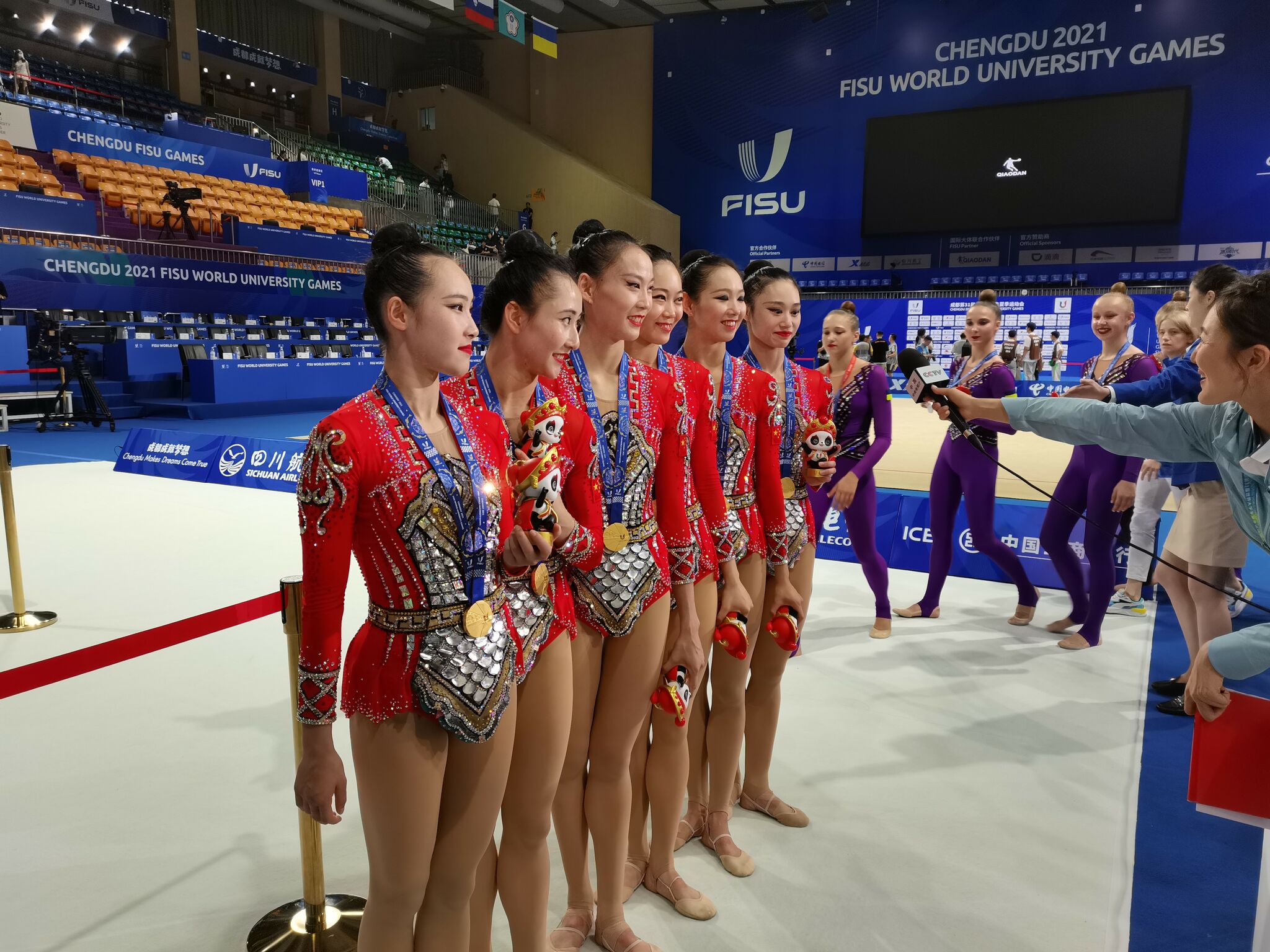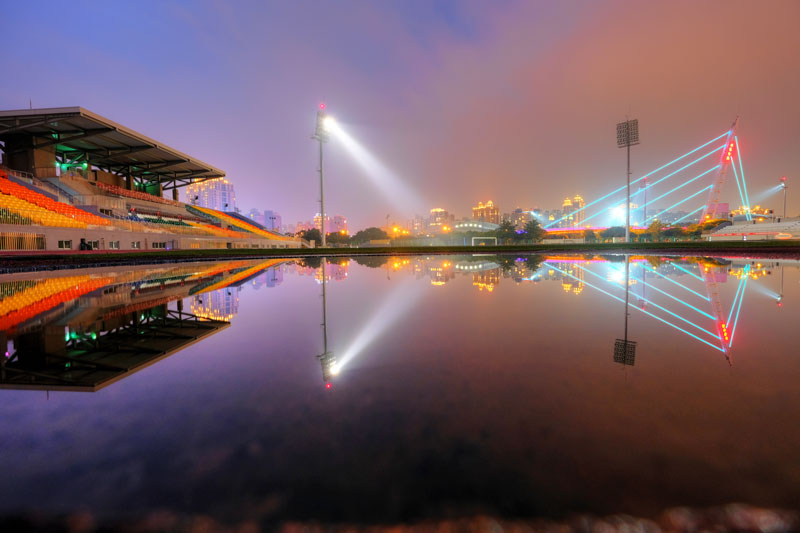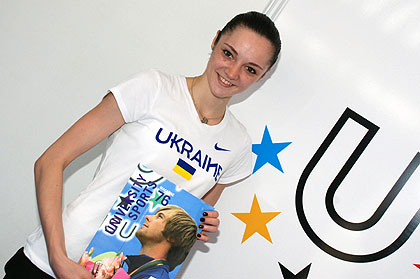 Anna Bessonova, with her 4th participation and 15 medals already a Universiade legend
Anna Bessonova, with her 4th participation and 15 medals already a Universiade legend
The Rhythmic Gymnastics competition is bound to start at the 25th Summer Universiade in Belgrade. FISU Media went to the competition venue to have a chat with the FISU Technical Chair for Rhythmic Gymnastics, former Olympian (1984 & 1988) Josef Zellweger (SUI) who has been one of the crucial persons to develop this sport at the Universiade. FISU Media also talked to one of the competing athletes: Anna Bessonova (UKR), one of the world stars of Rhythmic Gymnastics. FISU witnessed a scoop as we saw Anna practice the new repertoire she will bring during the Universiade competition in Belgrade. A piece of advice: if you’re in Belgrade, don’t miss this competition as Anna is stunning in her performance … as always!
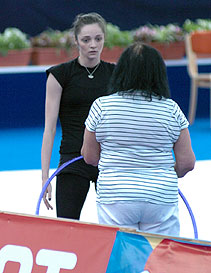 Anna talks to her coach during practiceAnna Bessonova
Anna talks to her coach during practiceAnna Bessonova
FISU Media: Anna, we at FISU Media have the impression that you very much like the Universiade because you keep coming back?
AB: (Laughs) ‘Yes, I like the Universiade, it’s like the Olympics, but much more relaxed. Everybody is enjoying this together. I’m here for the fourth time.
FISU Media: You have quite a Universiade medal collection?
AB: Indeed, five gold in Bangkok (2007), four gold and one bronze in Izmir (2005) and four silver and one bronze in Daegu (2003).
FISU Media: Do you still make any friends here because you take all the medals?
AB: (Laughs) ‘I didn’t come her for the medals, I came her to present my new program and I hope the audience and the judges will like it. If I win medals it will be great.’
FISU Media: Talking about your new program, how do you choose your music?
AB: ‘Sometimes I propose a piece of music to my coach and some times she proposes me some music. Usually we take care of that together for all four exercises. The music should be different and the style has to reflect the temperament.’
FISU Media: It must be hard to combine top sport and studies?
AB: ‘Of course it’s difficult with all the training, the travels, the competitions, but in the Ukraine I’m not the only one. There are a lot of accomplished athletes who are successful and who are enrolled at university as a student.’
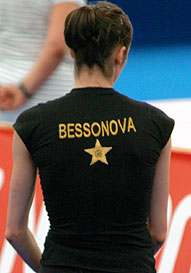 The name stands for perfectionFISU Media: How does an ordinary day in the life of Anna Bessonova look like?
The name stands for perfectionFISU Media: How does an ordinary day in the life of Anna Bessonova look like?
AB: ‘If I prepare for a competition, I usually have a choreography training at eight o’clock. Then I have a normal training. Afterwards, I have a recess for lunch and then I start to train again until the end of the day. When I’m not preparing for a competition I have usually one training every other day. Then it’s not that hard.’
FISU Media: As an Olympic medallist and a Universiade Champion, do you picture yourself as a role model for other student-athletes in your country?
AB: ‘I have indeed a lot of fans in the Ukraine. I’m glad I can teach someone how to be a good athlete and If I can show them the path how to, that is great.
FISU Media: Did your life in University change when you became a successful athlete? How did your friends and professors at university respond?
AB: They’re only sport medals. Nothing really changed. I’m still Anna. I’m happy when everybody is happy and I try to do the things I did before. Nothing changed much.’
FISU Media: What do you expect from this competition?
AB: ‘We never try to guess what will happen as many things can go wrong. It’s all in the details. We don’t try to predict anything and just prepare ourselves in the best possible way.’
FISU Media: How do you experience the life in the Universiade Village?
AB: ‘I think there is a great atmosphere in the entire Village and not only in the Ukraine building because in competitions like the Universiade we meet each other which is sometimes not possible during the year. We support each other we are happy for each other, we are looking for the results and everything. We have a very good time.’
FISU Media: Is the life in the Universiade Village any different than in the Olympic Village?
AB: ‘Yes I think so. The Universiade is more relaxed because we know it is hosted every two years so there is less pressure than at the Olympic Games, because they only are every four years.’
FISU Media: Bronze in Athens, Bronze in Beijing, silver in London … or gold?
AB: ‘We never predict in advance because we don’t like to do that. Let us be good athletes with good presentations and the results will come.’
FISU Media: If you win medals again here in Belgrade, you will have won the most medals ever by a single athlete on the Universiade.
AB: ‘I didn’t think about that. It’s very nice having this record. But I stress again the fact that I didn’t come here for the medals in the first place but to present my new program to the audience and the judges and I hope they’re gonna like it. And if the medals are the result of that it will be another success.’
FISU Media: A piece of advice to any athlete that comes to the Universiade?
AB: ‘The most important is to believe in yourself. My father, who was a professional football player, always said ‘if you fall just get up and try again and continue with your exercise as if nothing happened.’
FISU Media: What are you the most proud of in your life?
AB: ‘I’m proud of being a member of the sport family. My father was a professional football player, my mother a former world champion in rhythmic gymnastics, so I’m proud also being a sport woman and that I can train with some of the best coaches in the world and I hope they are also proud of me.’
FISU Media: If I look at your achievements, you must have a big house for all the medals?
AB: (Laughs) ‘In the beginning I put the medals with my mother’s and father’s, but now we separated them and they are in the most important place of the house.’
FISU Media: Four Universiades, two in Asia and two in Europe. Which is the one you like the most?
AB: ‘It’s difficult to choose. I think the Universiade becomes better and better all the time.’
FISU Media: Do you already have plans what you will do after your sporting career?
AB: ‘I want to give back to gymnastics. I want to work with children in gymnastics and I hope I can help them the way my coaches helped me.’
FISU Media: Thanks Anna and good luck.
The Rhythmic Gymnastics competition starts on July 9th – Christian Pierre
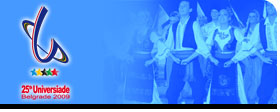
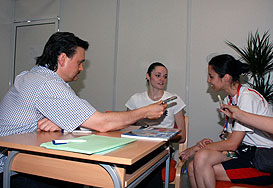 FISU Media at the interview with Bessonova and her interpreter
FISU Media at the interview with Bessonova and her interpreter
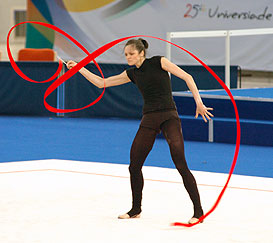 Anna practicing with the ribbon
Anna practicing with the ribbon
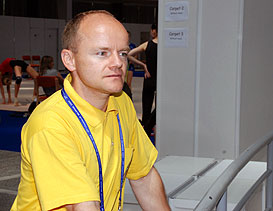 FISU Technical Chair Josef Zellweger overlooks a practice at the RG venue
FISU Technical Chair Josef Zellweger overlooks a practice at the RG venue
‘Over the years, we have been able to really improve the program of the Rhythmic Gymnastics within the whole sports program of the Universiade. It means that we could always prepare the best conditions, and therefore attract the best athletes, world champions, Olympic Champions and medalists, the best gymnasts’, Josef Zellweger explained to FISU Media the success of the RG competition within the Universiade. ‘It all depends on the circumstances. If you can deliver the best venues and competition conditions, the best eligible athletes will come. And so far we succeeded in that. And of course stars like Bessonova or the new Russian Olympic champion Kaneva, they come to the Universiade and to beat records of others who have been here before. It’s like building a house. You need a strong basic foundation and from there you can build a strong building. Of course you need a good cooperation with the Organizing Committee of the host city and you need to have competent people. And I want to mention that our Serbian hosts are the most competent people I ever had’, the FISU Technical Chair adds.
FISU Media: Some people like to compare the Universiade with the Olympics. What’s your opinion?
JZ: ‘First of all, the surroundings at the Universiade is more relaxed. This doesn’t mean that the level of the competition is less. But the gymnasts know that is not a fight for life or death so to speak. And sometimes because the pressure is not too strong they achieve better results than in the Olympics. Secondly, the Universiade is a biennial event instead of every four years, that’s why athletes are a little bit more relaxed also. The Universiade is on a high level. Each competition has its own level. After the Olympics, the Universiade is the most important multi-sport event. We shouldn’t regard the Universiade as just a training event for the Olympics. They are two different competitions on a very, very high level.
FISU Media: The competition is ready to start, tension is rising?
JZ: ‘Indeed, we still have some little details to work on, such as the airco. If it’s too strong this will have an influence on the ribbons. Small details, but on this elite level of perfection you need to handle the situation with care.’
FISU Media: Your predictions for the medals?
JZ: ‘I think their will be a huge battle for medals between Russia and the Ukraine, which will be great for the spectators.’


